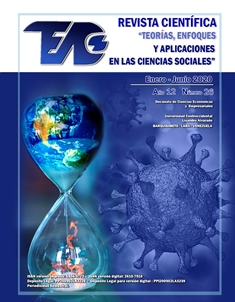Decisive generations of ucevistas in the conformation of the modern cosmovisión in Barquisimeto 1814-1858
Keywords:
worldview, generations, project of being, modernity, educationAbstract
The research presented below represents the effort to understanding the way the modern worldview developed in the city of Barquisimeto during the first half of the 19th century. It thus responds to a history of metaphysics, namely a historical ontology deeply rooted in the new project of being that was forged by the end of the colonial period in these regions of tierraadentro (inland). As any society is never contemporary with regards to all of its members, this project of being is embodied, in fact, in a given generation. It first appears in very few members, then it gradually spreads throughout the whole of society until it settles in the main political, economic, religious, legal, health and school positions, until it slowly but surely becomes ideology. Such ideology will become the main way of understanding world and therefore, also simplest dailylife situations such as measuring, planning, calculating and managing.A reflection that aims to explore the historical and ontogenetic root of such a decisive phenomenon, by removing the patina of its tiresome ideological condition, bringing back at the same time the living light of truth, revealing even in its path, the rejection or acceptance of aforementioned modern worldview project, becomes paramount.It is therefore a central objective of this research to witness firsthand the genesis and unfolding of the way the modern worldview developed in the city of Barquisimeto, and also to analyze how it spread through school systems.In this sense, the activity of the Pontifical University of Santiago de León de Caracas, later the Central University of Caracas, today simply UCV, carried out a fundamental task.We have relied entirely on Martin Heidegger's metaphysical, historical and methodological conceptions, as well as on the method of the generations proposed by José Ortega y Gasset.Let this be a favorable opportunity to pay a sincere tribute to the Central University of Venezuela (1721-2021) for its egregian work of almost three hundred years, as well as to all the Universities and the university lecturers from all over the country who fight and have devoted their lives to keep alive the burning flame for research amid the deplorable conditions to which the philistines in spirit have led us.Maintaining this very flame of investigation is, aristotelian speaking, exercising the essence of freedom factually.
Downloads
References
Barragán Abreu, Oscar J. (2006) Los Sufragios Piadosos y el Sentido de la Muerte en la Nueva Segovia de Barquisimeto. Barquisimeto. UCLA. Tesis de Maestría. s/p.
Blanco, Andrés E. (1947) Vargas el Albacea de la Angustia. Caracas. Ministerio de Educación. Dirección de Cultura.
Cañizales Verde, F. (1990). Génesis de la Diputación Provincial de Barquisimeto 1832. Barquisimeto. Ed..Boscán.
Duarte, Carlos. (1998). Testimonios de la Visita de los Oficiales Franceses a Venezuela en 1783. Academia Nacional de la Historia. Caracas.
Fernández, H. R. (1981). Memoria de Cien Años. Tomo I. Caracas: Ediciones del Ministerio de Educación.
Gaceta de Barquisimeto.01/02/1846. Año I.No.3. Andrés Domínguez a los padres de familia de la ciudad.
Gaceta de Barquisimeto.22/11/1851. El Gobernador a la Honorable Diputación Provincial.
Gaceta de Barquisimeto-01/07/1851.No.149. Año VI.
Gaceta de Barquisimeto-07/09/1847
González, Santos.(s/f) El Colegio Nacional de Barquisimeto: 1835-1884.
Heidegger, Martin. (1996). Caminos de Bosque. Ed. Alianza. Madrid.
Heidegger, Martin. (1999). Introducción a la Filosofía. Ediciones Cátedra. Madrid.
Heidegger, Martin. Ser y Tiempo (1993). Santiago de Chile. Ed. Universitaria.
Leal, Idelfonso. (1963). Historia de la Universidad de Caracas (1721-1827). UCV. Edic. de la Biblioteca. Caracas.
Leal, Idelfonso. (1981). Historia de la UCV (1721-1981)..Edic. del Rectorado de la UCV. Caracas.
Leal, Idelfonso. y García, A. (Edit) (1996). Egresados de la Universidad Central de Venezuela. 1725-1995. Tomo I. Caracas. UCV. edic. de la Secretaría.
López Bohórquez. Alí E. (2010) Universitarios en la Independencia y en la Formación del Estado Republicano en Venezuela (1808-1812). Mérida.
Revista Presente y Pasado. Año 15.No.30. Universidad de los Andes.
Ordenanzas municipales para el gobierno y policía de la muy ilustre ciudad de Santiago de León de Caracas. 1820.
Ortega y Gasset, J. (1959). En Torno a Galileo: esquema de la crisis. Madrid.Revista de Occidente. 2da edic.
Quintero, Inés. (Comp.). (2008). Más Allá de la Guerra: Venezuela en Tiempos de la Independencia. Caracas. Fundación Bigott.
Quintero, Inés.(2011) Discurso pronunciado en el Aula Magna de la UCV el 5 de julio de 2011 en ocasión del bicentenario de la firma del Acta de Independencia.
Published
How to Cite
Issue
Section
Derechos del/de autor/es a partir del año de publicación
Esta obra está bajo la licencia:
Creative Commons Reconocimiento-NoComercial-CompartirIgual 4.0 Internacional (CC BY-NC-SA 4.0)
Las opiniones expresadas por los autores no necesariamente reflejan la postura del editor de la publicación ni de la UCLA. Se autoriza la reproducción total o parcial de los textos aquí publicados, siempre y cuando se cite la fuente completa y la dirección electrónica de esta revista. Los autores(as) tienen el derecho de utilizar sus artículos para cualquier propósito siempre y cuando se realice sin fines de lucro. Los autores(as) pueden publicar en internet o cualquier otro medio la versión final aprobada de su trabajo, luego que esta ha sido publicada en esta revista.



